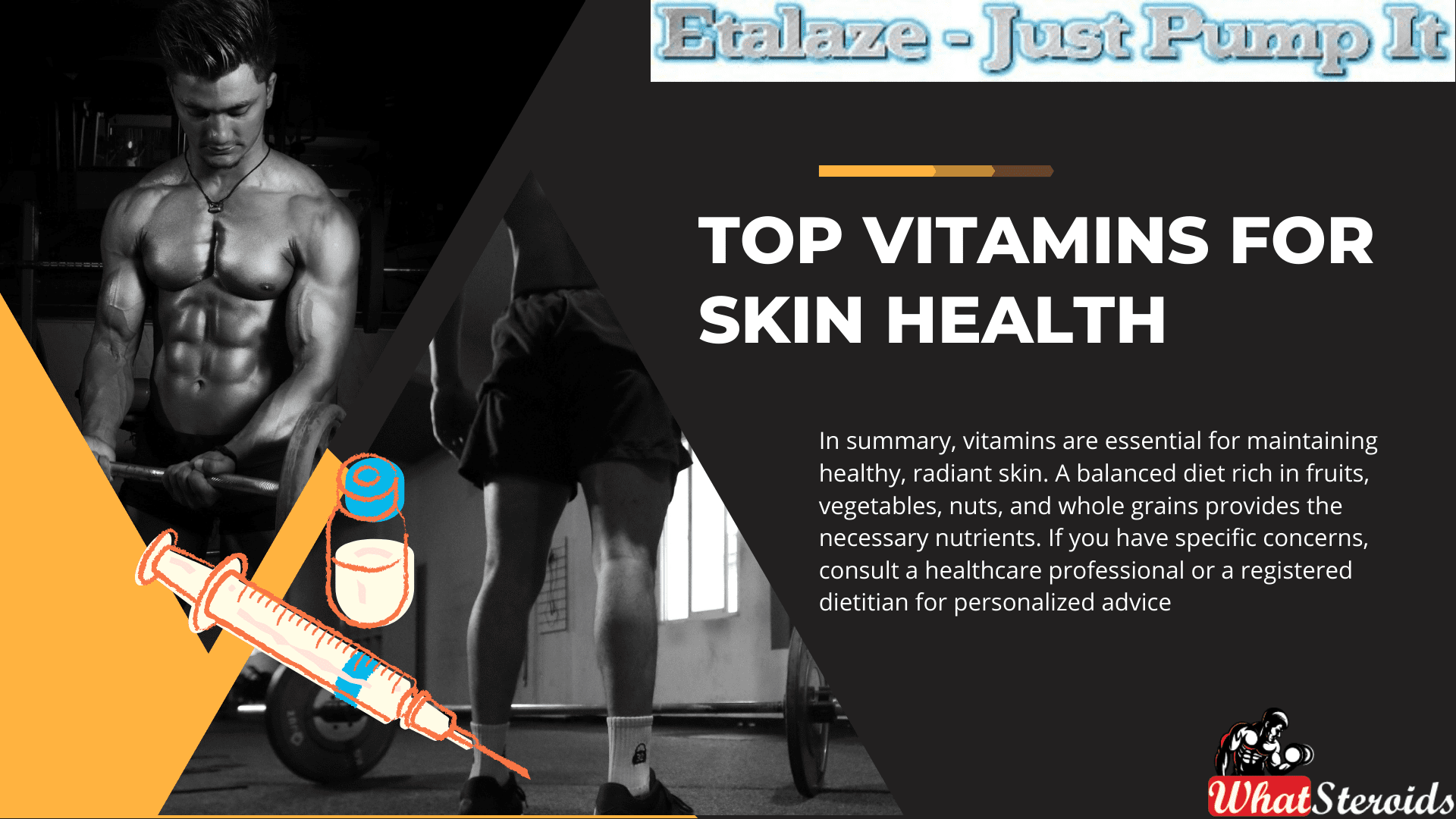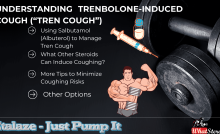Top Vitamins for Skin Health


Bodybuilders have unique nutritional needs due to their intense training regimens.
Here are compelling reasons why bodybuilders (and anyone, really) should pay attention to their vitamin intake for healthy skin:
Related Article: Are the Fruits Helpful For Body Fat Loss?
Cell Repair and Regeneration
Vitamins play a crucial role in cell repair and regeneration. Skin cells constantly undergo wear and tear due to exercise, sun exposure, and other factors. Adequate vitamins support the renewal process, helping maintain healthy skin.
Collagen Production
Collagen is a protein that provides structure and elasticity to the skin. Vitamins like vitamin C and vitamin E are essential for collagen synthesis. Without enough collagen, skin can become saggy and lose its youthful appearance.
Antioxidant Defense
Vitamins such as vitamin A, vitamin C, and vitamin E act as powerful antioxidants. They protect skin cells from damage caused by free radicals, which can accelerate aging and contribute to wrinkles and fine lines.
Wound Healing
Bodybuilders often experience minor cuts, bruises, or skin abrasions during training. Vitamins like vitamin K and vitamin C are involved in wound healing and tissue repair. Ensuring sufficient intake aids in faster recovery.
Sun Protection
While sunscreen is crucial, certain vitamins provide additional natural sun protection. For instance, vitamin D (produced when skin is exposed to sunlight) supports overall skin health and may help prevent skin cancer.
Reducing Inflammation
Intense workouts can lead to inflammation. Vitamins like vitamin E and vitamin D have anti-inflammatory properties, helping soothe irritated skin.
Hydration and Moisture
Proper hydration is essential for skin health. Vitamins like vitamin B5 (pantothenic acid) help maintain skin moisture levels, preventing dryness and flakiness.
Skin Barrier Function
Vitamins B3 (niacin) and B7 (biotin) contribute to a healthy skin barrier. A strong barrier protects against environmental stressors and prevents water loss.
Reducing Acne and Blemishes
Some vitamins, like vitamin A, regulate sebum production and prevent clogged pores. This can help reduce acne and blemishes.
Overall Health
Remember that skin health is closely linked to overall health. Vitamins support not only skin but also immune function, energy production, and muscle repair.
Generally, vitamins are essential for maintaining healthy, radiant skin. A balanced diet rich in fruits, vegetables, nuts, and whole grains provides the necessary nutrients. If you have specific concerns, consult a healthcare professional or a registered dietitian for personalized advice.
The Most Appropriate Vitamins for Bodybuilders
Let’s dive deeper into the world of vitamins and nutrients that can benefit your skin health. Here’s a list of 20 vitamins and supplements that can promote healthy skin:
Vitamin D
Known for bone health, vitamin D may also play a role in skin cancer protection. Adequate levels of vitamin D are associated with a lower risk of melanoma.
Vitamin C
An antioxidant that protects against free radical damage, vitamin C is essential for collagen synthesis and overall skin health. Include citrus fruits, bell peppers, and strawberries in your diet.
Vitamin E
Another antioxidant, vitamin E helps protect the skin from oxidative stress and supports skin elasticity. Sources include nuts, seeds, and spinach.
Biotin
A water-soluble vitamin, biotin supports healthy skin, hair, and nails. You can find it in eggs and legumes.
Vitamin A
Essential for skin health, vitamin A promotes skin repair and maintains a healthy complexion. Leafy greens and carrots are good sources.
Multivitamins
Taking a multivitamin can ensure you get a balanced mix of essential nutrients, including those beneficial for skin health.
Vitamin K
Supports blood clotting and may help reduce dark circles under the eyes. Leafy greens and broccoli are rich in vitamin K.
Vitamin B3 (Niacin)
Helps maintain skin barrier function and reduces redness. Found in meat, fish, and whole grains.
Vitamin B5 (Pantothenic Acid)
Supports skin hydration and wound healing. Avocado, mushrooms, and sunflower seeds are good sources.
Vitamin B6 (Pyridoxine)
Important for skin health and metabolism. Found in poultry, fish, and bananas.
Vitamin B7 (Biotin)
Essential for healthy skin, hair, and nails. Eggs, nuts, and sweet potatoes provide biotin.
Vitamin B9 (Folate)
Supports cell division and tissue growth. Leafy greens, legumes, and citrus fruits contain folate.
Vitamin B12 (Cobalamin)
Helps prevent skin dryness and promotes overall health. Found in animal products like meat and dairy.
Selenium
An antioxidant that protects skin cells. Brazil nuts, seafood, and whole grains provide selenium.
Iron
Necessary for oxygen transport and skin health. Include lean meats, beans, and fortified cereals.
Copper
Supports collagen production and skin elasticity. Nuts, seeds, and shellfish contain copper.
Silica
Important for connective tissue and skin health. Whole grains, leafy greens, and oats are sources.
Collagen Supplements
While not a vitamin, collagen supplements can improve skin elasticity and hydration.
Remember that a well-balanced diet, along with proper hydration, is crucial for maintaining healthy skin. If you have specific concerns, consider consulting a dermatologist or a registered dietitian for personalized advice.
Non-Vitamin Supplements for Skin Health
While vitamins play a crucial role, there are also natural supplements that can benefit your skin. Let’s explore some options:
Hyaluronic Acid (HA)
Although not a vitamin, HA is a powerful compound for skin health. It helps retain moisture, promotes collagen production, and supports skin elasticity. You can find HA supplements or consider foods rich in it, such as bone broth and certain vegetables.
Omega-3 Fatty Acids
These healthy fats are found in fatty fish (like salmon, sardines, and tuna) and flaxseeds. Omega-3s help reduce inflammation, which can positively impact skin health.
Zinc
Essential for skin repair and wound healing, zinc is found in legumes (such as lentils and chickpeas) and eggs. It also supports collagen synthesis, which contributes to skin strength and elasticity.
Collagen Peptides
This is a protein that makes up a significant portion of our skin. Collagen supplements (often in the form of peptides) may help improve skin elasticity and hydration.
Don't Miss: Top 15 Bulking Supplements Today
More Ways to Take Care of Your Skin
To maintain healthy skin, bodybuilders should consider a comprehensive approach that includes the following steps other than the use of vitamins.
Hydration
Internal Hydration: Drinking plenty of water is essential for overall health and skin hydration. Aim for at least 8-10 glasses of water per day.
External Hydration: Use moisturizers that are appropriate for your skin type to prevent dryness and flakiness. Look for non-comedogenic products to avoid clogging pores.
Hygiene
Showering Regularly: Shower immediately after workouts to remove sweat, bacteria, and dirt that can clog pores and cause acne. Use a gentle cleanser to avoid stripping the skin of natural oils.
Proper Cleansing: Use a mild, non-irritating cleanser twice a day. This helps to remove sweat and oils without damaging the skin barrier.
Diet and Nutrition
Balanced Diet: Eat a diet rich in fruits, vegetables, lean proteins, and healthy fats. Vitamins and minerals such as Vitamin C, Vitamin E, and zinc are crucial for skin health.
Supplements: Consider supplements that promote skin health, such as omega-3 fatty acids, which can help with inflammation and skin elasticity.
Sun Protection
Sunscreen: Apply a broad-spectrum SPF 30 or higher sunscreen daily, especially if training outdoors. This prevents UV damage and reduces the risk of skin cancer.
Protective Clothing: Wear protective clothing, hats, and sunglasses to shield the skin from the sun.
Managing Skin Conditions
Acne: Use non-comedogenic products and consider over-the-counter treatments with benzoyl peroxide or salicylic acid. For severe acne, consult a dermatologist.
Rashes and Irritation: Wear moisture-wicking, breathable fabrics to reduce friction and irritation. Apply anti-chafing products to areas prone to friction.
Rest and Recovery
- Adequate Sleep: Aim for 7-9 hours of sleep per night. Sleep is crucial for skin repair and overall recovery.
- Stress Management: Practice stress-reducing activities such as meditation, yoga, or deep breathing exercises. High stress levels can lead to skin issues like acne and eczema.
Regular Exfoliation
Gentle Exfoliation: Exfoliate 1-2 times a week with a gentle scrub or chemical exfoliant to remove dead skin cells and promote cell turnover. Avoid harsh scrubs that can cause micro-tears in the skin.
Avoiding Harmful Practices
Avoid Over-Washing: Over-washing can strip the skin of its natural oils, leading to dryness and irritation.
Avoiding Steroid Abuse: Steroids can cause a range of skin issues, including acne, stretch marks, and thinning of the skin. If using performance-enhancing substances, do so under medical supervision.
Consulting Professionals
Dermatologist Visits: Regular check-ups with a dermatologist can help address any skin issues promptly and provide personalized skin care advice.
Personal Trainers and Nutritionists: Work with professionals to ensure that your training and diet support not just muscle growth, but overall health, including skin health.
Overall
By integrating these practices into their routine, bodybuilders can maintain healthy, vibrant skin that complements their physical fitness achievements.
Must Read: Human Chorionic Gonadotropin – A Hormone of Health
Recent Posts
Decoding IGF-1 LR3: A Comprehensive Guide to its Benefits
IGF-1 LR3 (Insulin-like Growth Factor-1 Long Arg3) is a synthetic variant of IGF-1, a hormone…
AOD-9604: The Fat-Burning Peptide Explained
AOD-9604, along with the similar HGH Frag 176-191, is a peptide derived from Growth Hormone…
Understanding Trenbolone-Induced Cough (“Tren Cough”)
Trenbolone, a potent anabolic steroid, can sometimes cause “tren cough”—a sudden and intense coughing episode…
Creatine vs Myostatin: An Expert’s Analysis
Myostatin, a protein encoded by the MSTN gene, acts as a regulator of muscle growth.…
Raloxifene (Evista) 101: A Non-Surgical Solution for Gyno
Raloxifene, a selective estrogen receptor modulator (SERM), is one of the most valuable yet less…
Mastering Bodybuilding in 2025: Top Fitness Tips for Success
Bodybuilding is more than just a sport; it's a lifestyle that requires dedication, discipline, and…

